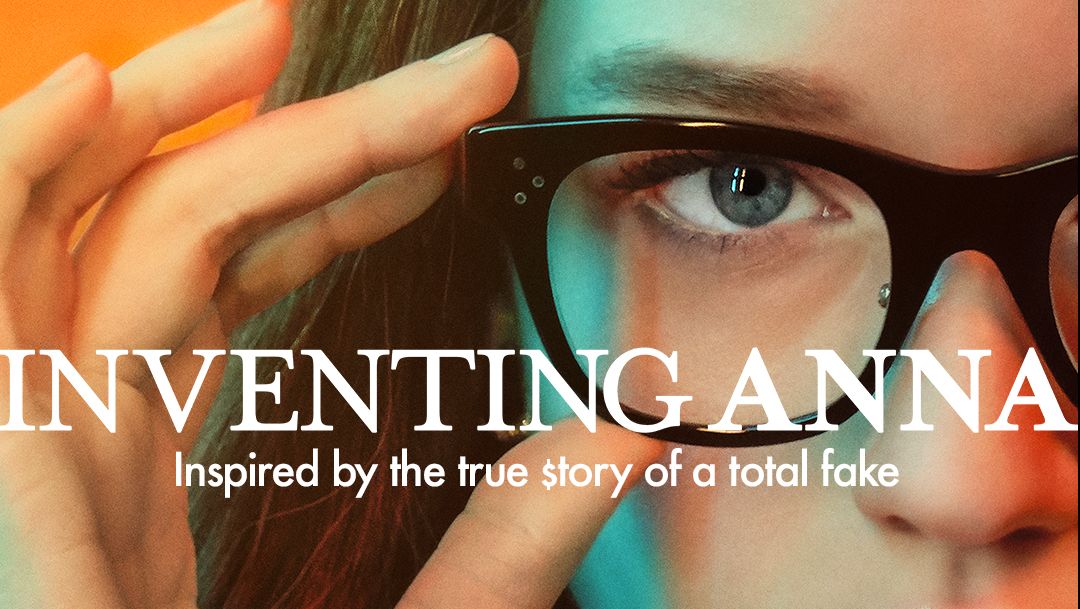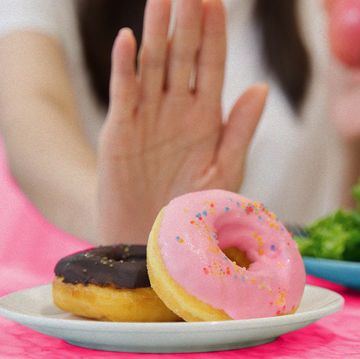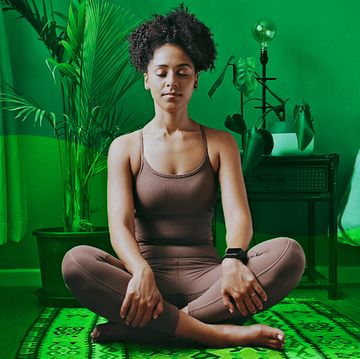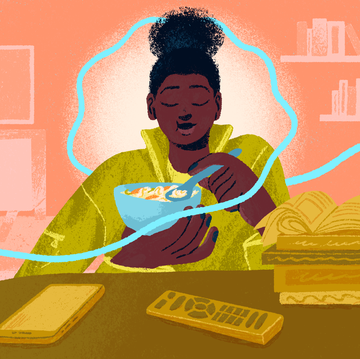When Jasmine Monroe’s fiancé demanded that she quit social media, she knew what she had to do. “I called the engagement off,” the 29-year-old says.
The Atlanta-based Monroe and her partner had been together for five years. Around 2010, she was finishing her broadcast journalism studies but was getting good at the newly launched Instagram too. Posting selfies, natural hair tips, and beauty hacks, Monroe was happy to be succeeding (10K followers at the time) and getting free stuff from brands. But her boyfriend started getting uneasy. Monroe was spending too much time on IG. He got envious when she poured her attention into content instead of him. He got annoyed when fans would approach them when they were out clubbing. “He said, ‘I don’t want you to be known by everyone. They’re getting so much of you, and I want it all.’”
He convinced her to stay off social media, and for a while, Monroe did. Two years went by, and she missed her digital life. Her followers wondered where she went. Not even 25, she had retired, and for a man she argued and fought with constantly. One night over dinner, surrounded by friends, he proposed. She said yes, tentatively, and he reiterated that if the marriage was going to work, she’d have to give up social media for good. “We were literally walking out of the restaurant, and I was like, ‘Wait a minute.’ I had to remember who I was.” She ended it right there in the parking lot. “It was hard for him, but it wasn’t hard for me at all.”
Granted, his control issues justified ending the relationship — social media merely gave the red flags a sturdy base to wave from. Still, Monroe, now married (to someone else) and a full-time influencer, is unwavering and unapologetic about choosing social media over her relationship, and she has no regrets. Well, one. “I always think, ‘What if I had kept going and never stopped?’ But I have to do this. It’s like a vein in my body. If you cut one, you could die.”
If social media were a person, it would be a confident but clumsy know-it-all teenager in 2022: Myspace, Facebook, Twitter, and YouTube all started between 2003 and 2006. You already know that social media has revolutionized life as we know it, altering every sector from the arts to commerce to government. Less examined, or less fun to talk about at least, is how social media has altered expression itself. It’s altered our brains too. Accruing likes, experts say, impacts our noggins in ways not unlike narcotics or gambling. No doubt, these mediums can help facilitate a lot of good — think of all the GoFundMe stories you read that made you cry — but they can be portals to the dark side too, giving people a way to act out sinister fantasies or, on the less-extreme end, present a version of themselves incongruent with reality. Especially on Instagram, where the whole point is to be yourself, but way better. “We only give y’all what y’all see,” Monroe tells Shondaland. “We’re not showing you everything.”
Voyeurism, wish fulfillment, fantasy projection — whatever you want to call it, social media is, for many, as integral to life in the 21st century as electricity. And its integration into (or, as some would say, its affliction on) daily life has bled deep into our pop culture as well. Movies like Ingrid Goes West and The Circle and TV shows like You, the upcoming Hype House (which puts social-media influencers in one house), and even the new Shondaland series Inventing Anna explore the many roles social media plays in the layers of life.
Anna Delvey, convicted of scamming New York’s elite out of more than $200,000, used social media to lure unsuspecting people into her web, posting image after image on Instagram that purported a fabulous jet-set life of the German heiress she claimed to be. As the series shines a spotlight on how Delvey (or Anna Sorokin, as she was born) used her image to dupe Manhattan’s most fabulous and most connected people, it also illuminates how social media can bring out the worst in people … or facilitate the worst instincts already there.
To this day, the convicted con woman maintains she’s not sorry, a declaration that signifies how deliberately cunning she was in crafting an image. She infiltrated the art world by posting pictures of cutting-edge pieces that appealed to the in-the-know and conned the jet set with shots of her partying in glamorous places, flaunting designer duds. And while the pain, betrayal, and embarrassment she caused people who thought she was a friend places her in a special class of manipulators, the deception she participated in isn’t uncommon. Nearly everybody edits out the boring or unsavory parts of their lives for social media; nearly everybody, at some point or another, has used social media to make their lives seem more interesting or fabulous than they really are. As Delvey’s attorney said at her 2019 trial, “There’s a little bit of Anna in all of us.”
What does it mean that we’re all knowingly walking into a hall of mirrors and still believing the distortions beaming back at us? For starters, it’s absolutely playing tricks on our minds, and the effects might be irreversible. Never mind the damning testimony from people at social-media companies, like Facebook whistleblower Frances Haugen, but science backs this too. Numerous studies link using social media to anxiety and depression, especially in kids and teens. Given all we know about how destructive it can be, it’s worth asking aloud: Has social media just become too much?
“There’s a lot of distrust,” says Michael Brenner, an expert on content marketing and the author of Mean People Suck, which advocates for compassion and empathy in business. While most of us aren’t influencers (or, as many people prefer to be called these days, “content creators”) with more than 15K followers, Brenner says that even average users are growing weary of these platforms, thanks to scandals that go public, privacy and data-sharing concerns, the prevalence of misinformation, and exhaustion with the cacophony of noise.
Marketers are growing skeptical too, he says, and given that some 80 percent of traffic to their sites comes from search engines, most brands aren’t as keen to be super-active on social media as they were years ago. Some 22 percent of Instagram users considered leaving in 2020, according to one study; Facebook, Twitter, and TikTok had even higher rates of possible platform exits, at 45, 32, and 29 percent respectively. A 2021 Pew Research Center study said the share of Americans using Instagram and Twitter was statistically unchanged since 2019, pointing to a slowdown in the kind of rapid adoption we used to see back in the day. “We’re not engaging the same way we were before,” Brenner says. “Society is starting to understand that social media in its current form has been had. It’s not brought us together; it’s not self-regulating. At the current trend, we’re going to be in an all-out civil war or something until there’s change.”
A social media-fueled Armageddon might be a way off (let’s hope), but we do know that, right now, social-media content creators are increasingly comfortable lifting the curtain a bit, sharing some of the toxic things they deal with in their trade. Thee Skin Boss, a New York-based aesthetician, recently shared a TikTok from user Joshua Holmes in which Holmes voices the frustrations about his work, and the tweet quickly went viral. “Everybody wants this job because it’s not a 9-to-5, but ever since going full-time, I realize I traded my 9-to-5 to work 24-7 instead," Holmes says in the video. "Not a second goes by that I’m not thinking about making content. I don’t watch sunsets or have genuine moments with my friends without being like, ‘Guys can we do that again? I wasn’t recording.’”
Monroe echoes that; she says she has ended friendships over social media. “Once we were at Six Flags, and [my friends] were like, ‘We don’t want to be in videos; we just want to have fun.’ I was like, ‘How else would my followers know I’m here?’ I had to let those friendships go. This is my life; I have to do this, so this friendship isn’t going to work.”
LaToya Shambo, the CEO of the influencer marketing agency Black Girl Digital, says that part of her job connecting content creators to brands is playing the occasional therapist. “[Being an influencer] is demanding,” she says. “If you don’t figure out how to manage your time, you’re going to feel burned out and overwhelmed.” Perhaps because she sees firsthand how social media can impact people’s real lives, even she is careful about her own use, preferring to, as she puts it, “post and ghost. There are times when I can’t log on because it can easily shift my mindset and my energy, no matter how I curate my time line. I’m deliberate.”
That said, Shambo says social media isn’t going anywhere — there’s too much money to be made, both for companies and for individuals sharing their lives for sponsorship. Of course, there’s a whole ocean of possibility between using social media a lot and not using it at all, and the best course for people overwhelmed with social media but not wanting to abandon it entirely is to find a reasonable middle ground. Even influencers like Monroe do it that way: She chooses one day to shoot content, another day to edit, another day for strategy and planning, then leaves it alone the remaining days … if possible. And then there are parts she doesn’t show, like time with her husband and details about her father, who has terminal cancer. “We [influencers] have things that happen in our lives where, even if you think our lives are perfect, we are human. We’re real. Oftentimes, followers [make us] feel so obligated, like you owe them something. Just because I’m here doesn’t mean I owe you anything. It makes you feel like you have to be on 24-7, like you always have to step your game up.” Does she think about retiring? “I do,” she says. “But I don’t know if I’ll ever stop, ’cause it’s so easy for me.”
Malcolm Venable is a staff writer at Shondaland. Follow him on Twitter @malcolmvenable.
Get Shondaland directly in your inbox: SUBSCRIBE TODAY














